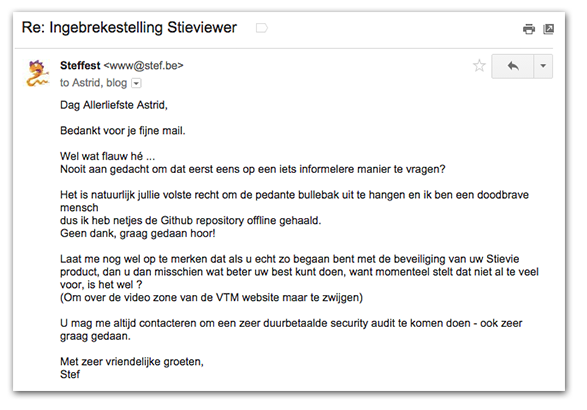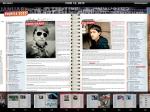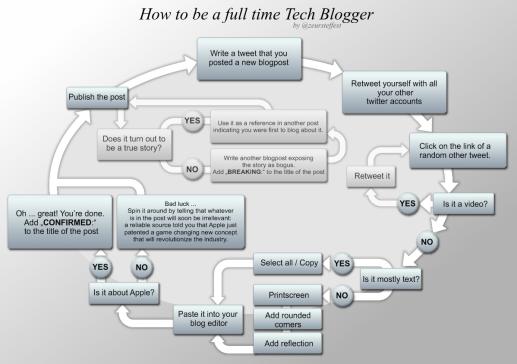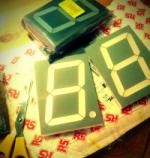Bekijk terug alle berichten.
Stieviewtniemier
Flauw zenne ...
Het was natuurlijk te verwachten maar de naïeveling in mij blijft natuurlijk denken dat moderne mediabedrijven iets van community communicatie afweten.
Niet dus.
Vandaag een officiële ingebreke stelling in de bus i.v.m. de stieviewer.
Het volledig document is hier te vinden.
Het is natuurlijk hun volste recht om de pedante bullebak uit te hangen.
Jammer dat ze dergelijke initiatieven vanuit hun eigen gebruikersgroep zo aanpakken.
Afin - whatever.
Ik ben natuurlijk nen doodbrave mens en heb netjes de Github repository offline gehaald.
(En dan had ik mijn Stievie-recorder nog niet eens gereleased :-) )
Mijn Stievie account is trouwens niet geblokkeerd.
Die 10 euro per maand ... die willen ze dan weer wel!

Warning! contains facts, analyst says
Analyst says that 50% of you will read this blogpost.
How about you, are you reading this post?
This is part 2 of the "How to be a full time tech blogger" series.
I've done some extensive analysis myself by reading less then half a dozen blogposts - in specific, 4 blogposts about the analysis of the effect of the new iPad.
Boy Genius reports: "Canaccord Securities analyst Mike Walkley says ..." that "Android tablets can’t compete with the iPad"
Meanwhile, just one day before, the same blog claims that "Analytics firm Strategy Analytics reports ..." that "Android tablets finally dent iPad market share"
At the same time, "global market intelligence and consulting firm IDC" predicts that Android tablets will overtake the iPad in 2016.
Hey, but what do they know, they're just market intelligence and consulting dudes, not analysts like "Needham analyst Charlie Wolf" who sees that "Apple’s iPad will still dominate tablet market after a decade"
Confusing? not at all, that's the beauty of it: since everything is an opinion, everybody is right!
Currently I'm writing a whitepaper on a method of analysis of technology related articles aiming to chart the relationship between relevant info and specific vocabulary,syntax and grammar.
I don't have any hot graphics for you just yet, but I do have some useful insights I'm willing to share:
- the amount of the word "analysis" seems directly proportional to the amount of "IMPORTANT RELEVANT INFO" in the article
- the location of the word "analysis" is a duality: small to normal amounts of "IMPORTANT RELEVANT INFO" seem to prefer the word "analysis" at the start of the sentence but for the greatest impact, the really big "IMPORTANT RELEVANT INFO" put the word at the end, right after the comma. e.g. "in 4 decades time, plain paper will be completely replaced by electronics, analyst says"
- Every "call to action" doubles the "IMPORTANT RELEVANT"-value of the preformentioned IMPORTANT RELEVANT INFO.
Let me clarify that last point.
Every writer knows that every blogpost should end with a big fat "Call to Action" - right?
No post is worth reading - let alone worth writing - without one.
Don't take my word for it - everybody says so
To really spice up your point, you must engage your readers, pull them in, get them clicking - and the ultimate weapon of choice is "ask them for their opinion so they can be an authorative analyst too" , right?
It's all a matter of efficiency.
What's the most time consuming part of writing non-fiction articles?
It's checking the facts.
Now here it is: the golden tip:
Everytime you write about what someone else says or predicts or sees some interesting correlations happen
- You don't have to hunt for news yourself as someone else already has written it down for you
- There are no facts. Ergo: you never can go wrong.
- Lifting the simple fact of fact-checking out of the equation, cuts your valuable writing time in half.
That's not a Win-Win , that's a Win-Win-Winning!
Cover it up by asking your reader for their analysis and BOOM! the easy-peasy never-wrong instant formula for filling up your tech blog.
Everyone can do it - so can you.
So, What do you think?
Aren't you glad you've read this highly valuable important relevant piece of info?
Het winkelcentrum
Er is een nieuw winkelcentrum geopend.
Echt prachtig. Mooie ronde vormen, overal natuurlijk lichtinval, veel aandacht aan de atmosfeer, groenzones, fonteintjes ...
Bijna een klein dorp, met koffieslurp zitjes op de juiste plaatsen en ruime winkelstraten.
Dat is ook belangrijk natuurlijk: de winkels, want zonder winkels geen klanten - en daar gaat het over.
En winkels zijn er met hopen, wel 4 of 5 verdiepingen boven elkaar.
Mooi hoor! Enkel de coolste en meest trendy merken die zelf ook kosten nog moeite sparen om hun winkel zo aantrekkelijk mogelijk te maken.
Een shoppingparadijs! De toekomst!
Ik had een idee: weet je wat ook trendy is?
Versgeperste biosapjes, met gember en wortel en zo.
Want al die shoppende mensen krijgen dorst en spenderen graag wat euro's extra voor een supergezonde dorstlesser.
Dus ik gaan praten met de eigenaars van het winkelcentrum.
Man man, ze leggen de lat hoog, zeg! Wat een hoop regeltjes waaraan je moet voldoen, en wat een schandalig hoge huurprijzen!
Maar goed, we zijn ondernemend dus we gaan ervoor!
Ik heb een mooi plekje gehuurd en flink geïnvesteerd om er een pareltje van te maken: de perfecte highclass "health and food" bar uit mijn dromen.
Bon, de inkomsten vielen misschien initieel wat tegen, want blijkbaar was ik niet de enige sapjesbar in het winkelcentrum en bovendien heeft het winkelcentrum zelf ook overal mensen rondlopen die gezonde drankjes verkopen.
Ach ja, al bij al mag ik niet klagen en het is goede reclame voor mijn zaak.
Gelukkig heb ik wat vaste klanten dus dat draait wel.
Dan gebeurt er echter wel iets vreemds ... Ik snap het niet zo goed:
Er komt een meneer langs van het winkelcentrum die vertelt dat ze heel blij zijn dat ik zo'n lekkere sapjes maak, en dat ik mijn sapjes voortaan via hun mensen moet verkopen, want dat is toch veel gemakkelijker voor de klanten hé. Ik mag dan zelf in mijn winkel wel niets meer verkopen - dat zou immers verwarrend zijn - en dat alles zou mij maar 30% van mijn omzet kosten, bovenop de huurprijs uiteraard.
Ik moet niet meteen beslissen, hoor, ik mag er even over nadenken, maar ze zeggen er ook wel bij dat als ik niet toestem ze helaas genoodzaakt zijn mijn huurcontract op te zeggen zodat ik hier over 3 maanden weg moet.
Wat vreemd! Ik heb er al met wat mensen over gesproken en blijkbaar kan ik er niet veel aan doen ... Velen zeggen dat ik er zelf voor heb gekozen om iets in dat winkelcentrum te beginnen, en dat het winkelcentrum mag doen wat het wil ... Ik ben immers vrij om te verrekken, zeggen ze dan, maar ja, nu heb ik net alles geïnvesteerd in mijn mooie nieuwe zaak ...
Heel enthousiast ben ik eigenlijk niet meer...
Twas al lang geleden, dat ik wat Apple bashing heb geschreven, want daar (en hier en hier) gaat het natuurlijk over:
Al die uitgevers die net flink geïnvesteerd hebben in een iPad app, en nu te horen krijgen dat ze zelf hun kranten niet mogen verkopen, maar dat Apple dat voor hen gaat doen, dat is toch immers veel beter voor de klant, nietwaar? En dat alles voor slechts 30% van hun omzet!
Ik was verbaasd toen ik de commentaren las dat veel mensen dat blijkbaar geen probleem vinden. Er wordt geschermd met leuzes als "beter voor de klant" en "het is Apple's platform, zij bepalen de regels" en "je kiest er toch zelf voor om een Apple te kopen of voor te ontwikkelen"
Onzin allemaal: ja, je kiest zelf als ontwikkelaar voor Apple, het zijn immers coole dingen, die iphones en ipads, maar als Apple zich het recht toeeigend om zomaar de regels en afspraken aan te passen en je eruit te kegelen als het ze niet bevalt? En je geen andere keus laat dan 30% van je inkomsten aan hen af te staan?
Er is een term voor dat soort gedrag: Mafia-praktijken
En nee, dat is uiteindelijk helemaal niet goed voor de klant.
Ik heb niets tegen de AppStore op zich, hoor, en het is normaal dat er een deel van je omzet naar het distributiekanaal gaat, dat is bij boekhandels en supermarkten niet anders.
Het probleem is dat Apple zich komt moeien met het business model van hun leverancier, zelfs NADAT de "verkoop" (de download van de app) al gebeurd is, en de leverancier geen andere optie laat.
Nee, dank je, ik hoop ten stelligste dat de uitgevers zich hier niet laten doen en andere manieren vinden om hun publicaties digitaal te verkopen.
Ik hoop dat over enkele jaren de bekende slogan wat wordt uitgebreid: "Yes, there's an app for that, but why would you need one?"
Update: Een leuke follow-up post van Jan Seurinck
2 meningen - maar eigenlijk beogen we hetzelfde: Waarom geen goede universele (Mobile) web-app in plaats van een iPad-only app ?
My biggest disappointment of 2010

I really try to keep a positive mindset,
but sometimes I have to whine a bit :-)
Looking back at 2010, the biggest disappointment of the year is .... digital magazines.
The future looked so bright:
sexy consumer devices like the iPad would save the publishing industry and everyone would be happy.
Publishing software companies like Adobe rushed out digital publishing solutions like the Digital Publishing suite.
Every publisher and newspaper went head over heals to release some form of iPad app, pushing their digital content to thousands of eager new readers.
One slight problem: THEY ALL SUCK !
Really, everybody who's happy about the current state of iPad magazines must have had really low expectations.
Almost all publishers took the fast and easy approach and just whipped up some sort of image viewer offering their existing print-ready documents to the screen.
Very understandable: it's the safest thing to do with the lowest amount of risky new investments.
As in most cases, the fast and easy approach rarely is the best one.
It results in substandard products that are a mere shadow of what they could have been.
Simply copying the paper based layout to a screen does NOT result in pleasant reading experience: as most readers screens are too small to display one standard printed page in a readable manner, you end up zooming and scrolling in all directions, hunting for the flow of an article.
So called "premium content" mostly consist of making links clickable and whacking YouTube video on top of static pages.
And it's such a shame: there's so much great content out there and thousands of people willing to pay for it.
I would gladly pay for a decent magazine, after all creating content is a tough job, there's a reason why there are professional journalists.
Is it too mush to ask for an enjoyable reading experience?
Stop converting paper pages to the screen: it didn't work for the web and it certainly doesn't work for e-readers.
Digital publishing still is a niche, but the only way to expand it is to create a compelling product specifically targeted for e-readers.
To all publishers: take a look a the various eBook readers as they already solved most of you problems
- offer customizable fonts
- offer adjustable font sizes and FLOW your text: there's nothing as annoying zooming in and having to scroll from left to right constantly because the text doesn't wrap.
- provide both landscape and portrait layouts. yes, that's more work for your understaffed design team but it's a need-to-have , not a nice-to-have
- DON'T publish you magazine as a series of static image files, unless you're a comic. Keep text as text, images as images.
This is an example of a zoomed in page of 'The Tijd" newspaper app (which is a series of jpeg images)
It's hurting my eyes! - integrate multimedia directly from the start into the articles, don't add them later as some form of icing on the cake: don't decorate, design.
- don't launch your readers outside your magazine with your external links, handle them internally.
- avoid scrolling, paginate
- if it's too expensive to design a digital version of your magazine, leave out the design and just offer the articles as text.
Whatever you do, DON'T simply reuse your paper design.
Reading an eBook on e.g. iBooks, Stanza or a Kindle is relaxing and comfortable because they follow those rules.
Reading a magazine or a newspaper on the iPad is frustrating and annoying.
One shining good example is the Wired tablet app: very well made, good use of media, optimized layout.
The only thing missing is scalable fonts.
The worst examples are all those Magworld magazines. For example the music magazine OOR. That's one example that is SCREAMING for a digital multimedia version, but in its current offering it's completely crap on a digital device. What a missed opportunity ....
Am I alone in this frustration? Some seem to think so, but again: don't settle for "good enough"
"good enough" won't stick, and ultimately: "good enough" won't keep selling.
Maybe I missed some magazines that DO get it right?
I hope so, please let me know.
How to be a full time Tech Blogger
Today I'm proudly introducing the first ever guest posting on this blog.
It's my good friend @zeursteffest!
His motto is "I'm whining about it so you don't have to"
I got to know him after @inferis pointed me in the right direction.
Normally I don't like negative people all that much but it became clear that he had some refreshing insights to share.
So without further due - @zeursteffest: the keyboard is yours.
So, I've noticed you don't blog all that often and I've decided to help you out a bit.
Your blog is crap - it's rubbish - It's going nowhere - so here are some tips.
First: where are the ads, man? How do you expect to get some ROI without advertisement? For Pete's sake, put some Google adwords between your posts, that's basic stuff!
Second: start hyping up your posts: start using words like boobs and sex and free beer and babes and nude cars and stuff, don't you know anything about SEO?
Third: I've read every single technology and gadget blog the last 2 weeks and made a detailed analysis of how things work around the scene. I've written a bling book about it, but I'm giving - that's right: GIVING you this wicked sick flowchart FOR FREE so even you get to be a full time Tech Blogger. (Once you put some ads on here, that is)
Don't thank me now, thank me when you ... err ... well, just don't and get your act together.











